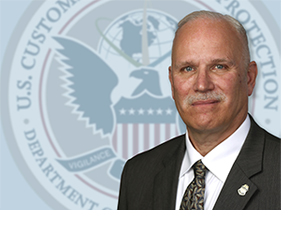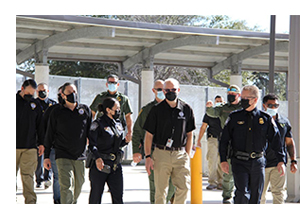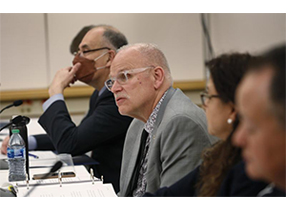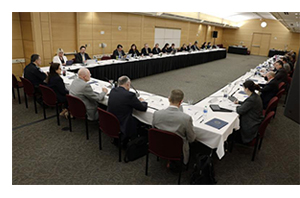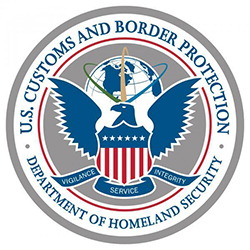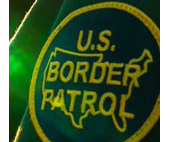In this Update
- Message from the Deputy Assistant Commissioner
- Commissioner Magnus Looks Ahead
- CBP Commissioner Magnus has First Public Meeting with Trade Advisory Committee
- The Uyghur Forced Labor Prevention Act Enters into Force on June 21
- CBP Enforcement of Executive Orders that Prohibit Certain Russian Federation Imports and Exports
- Enforcement News from Across CBP
Message from the Deputy Assistant Commissioner
CBP Access is an electronic newspage developed by the Office of Congressional Affairs for Members of Congress and staff. If you are interested in subscribing to the CBP Access email distribution list, please send an email to OCAInquiry@cbp.dhs.gov.
From his first day as CBP’s Commissioner, Chris Magnus has been focused on building relationships and strengthening support for CBP’s mission, activities, and its dedicated workforce. With a long, personal history of law enforcement, public service, and leadership, Commissioner Magnus deeply understands the value of people and partnerships. Commissioner Magnus has spent much of his time over the last four months visiting with CBP’s frontline officers, agents, and other professionals from across the country to learn about their daily challenges and concerns, as well as their successes and ideas for improvement. This latest CBP Access update provides a look into Commissioner Magnus’s background, the vision he has for CBP, and his plans for building partnerships, relationships, transparency, and trust.
–Stephanie Talton, Deputy Assistant Commissioner, Office of Congressional Affairs
Commissioner Magnus Looks Ahead
In a recent Frontline feature article, CBP Commissioner Chris Magnus laid out his vision for CBP and his intent to build positive relationships that will help move the agency forward.
Commissioner Magnus, who most recently served as Tucson’s Chief of Police, was sworn in on December 13, 2021, becoming the fifth confirmed CBP Commissioner since the law enforcement agency was established in 2003.
After four decades in law enforcement, Commissioner Magnus now leads a law enforcement agency of nearly 65,000 men and women, with a mission to combat terrorism and transnational crime, secure the border, streamline lawful trade and protect revenue, and facilitate lawful travel. CBP is the United States’ first unified border law enforcement entity and takes a comprehensive approach to border management and control. CBP combines customs, immigration, border security, and agricultural protection into one coordinated activity.
Commissioner Magnus believes that among all the challenges facing CBP today, the lack of public understanding of everything that CBP does is one of the most pressing. He wants to spend time to help the public, legislators, and the media understand CBP, the scope of what it does, the difficulties it faces, and the dedication of its workforce.
Addressing the welfare of the dedicated CBP workforce is one of the Commissioner’s top priorities. He wants to hear from employees about their struggles and help them be more resilient by investing more in mental health, providing more support to families of employees, and improving suicide prevention efforts.
Commissioner Magnus asserts that CBP is first and foremost a law enforcement agency – one that is committed to following the law and implementing policies. He also acknowledges that while CBP is often at the center of political controversy, he intends to try to step away from the politics and focus on CBP’s operational concerns.
The Commissioner’s operational focus will prioritize regular and intentional collaboration with CBP leadership, specialists and operators, and external partners like Congress, trade and travel industry, and other government partners.
CBP Commissioner Magnus has First Public Meeting with Trade Advisory Committee
A spirit of cooperation was the prevailing mood when members of the new 16th term Commercial Customs Operations Advisory Committee, known as COAC, recently gathered in Washington, D.C., for their first public meeting with CBP Commissioner Chris Magnus.
COAC is a 20-member advisory committee that was established by Congress in 1987. The committee provides advice and recommendations to CBP and the Department of the Treasury on the commercial operations of CBP and trade-related interdepartmental functions. Some of the issues that COAC focuses on include enhanced border and supply chain security, international efforts to harmonize customs practices and procedures, import safety, compliance, and modernization and automation processes used to facilitate trade.
Commissioner Magnus, who co-chaired the meeting with Treasury Department Deputy Assistant Secretary Tim Skud, thanked the committee for its, “willingness to take on this incredibly important work with us to modernize trade and tackle the many big challenges in front of the trade community. Your collaboration with CBP and willingness to provide us with frank, thoughtful feedback is what makes this committee so valuable.”
Commissioner Magnus also expressed his commitment to the trade community and the American public. “My first 100 days have gone by in the blink of an eye but let me assure you that my CBP colleagues and I are laser-focused on the trade mission and its importance to both our economy and the nation,” he said.
During the meeting, Commissioner Magnus shared some highlights of CBP’s recent trade mission enhancements, including further investment in additional non-intrusive inspection systems, implementation of the Uyghur Forced Labor Prevention Act, and enhancement of the Advanced Trade Analytics Platform. He also noted that CBP is working on two final rules regarding customs brokers that reflect the challenges of the modern operating environment. Magnus also spoke about ACE 2.0, a new cargo processing system that will ultimately replace the Automated Commercial Environment, or ACE, as well as continuing development of CBP’s trusted trader program and the Customs Trade Partnership Against Terrorism.
Before concluding, Commissioner Magnus announced a new COAC initiative—a domestic manufacturing and production working group. “This group will work to further understand the areas of trade within CBP’s authority that impact our domestic industries,” he said.
Commissioner Magnus emphasized the importance of working with the trade community. “When we work together, we can improve the supply chain consumers rely on, protect citizens from counterfeit, dangerous and defective products, cut through unnecessary red tape and redundant processes and better address critical issues including forced labor and national security.”
Additional information is available in the full CBP.gov article on the March COAC meeting. The next COAC meeting is scheduled for this June.
The Uyghur Forced Labor Prevention Act Enters into Force on June 21
The Uyghur Forced Labor Prevention Act (UFLPA) was signed into law by President Biden on December 23, 2021. It establishes a rebuttable presumption that the importation of any goods, wares, articles, and merchandise mined, produced, or manufactured wholly or in part in the Xinjiang Uyghur Autonomous Region of the People’s Republic of China, or produced by certain entities, is prohibited by Section 307 of the Tariff Act of 1930 and that such goods, wares, articles, and merchandise are not entitled to entry to the United States.
The presumption applies unless the CBP Commissioner determines that the importer of record has complied with specified conditions and, by clear and convincing evidence, that the goods, wares, articles, or merchandise were not produced using forced labor.
The UFLPA also requires the interagency Forced Labor Enforcement Task Force, chaired by the Secretary of Homeland Security, and in consultation with the Secretary of Commerce and Director of National Intelligence, to develop and submit to Congress a strategy for supporting CBP’s enforcement of Section 307 of the Tariff Act of 1930 with respect to goods, wares, articles, and merchandise produced with forced labor in the People’s Republic of China.
CBP recently established a webpage dedicated to the implementation of UFLPA. The webpage will continue to be frequently updated with new information and guidance.
CBP Enforcement of Executive Orders that Prohibit Certain Russian Federation Imports and Exports
President Biden recently signed two Executive Orders (EO) prohibiting certain Russian Federation imports as part of the Administration’s commitment to holding Russia accountable for its continued aggression in Ukraine. EO 14066 includes a prohibition on the importation of crude oil, petroleum energy products, liquified natural gas, and coal products from the Russian Federation, and EO 14068 prohibits the importation of fish, seafood, alcoholic beverages, and non-industrial diamonds that are products of Russia.
CBP plays a critical role in implementing and enforcing prohibitions on imports into the United States, as well as on exports of luxury goods. CBP coordinated with the White House, the U.S. Department of the Treasury’s Office of Foreign Assets Control (OFAC), the U.S. Department of Commerce’s Bureau of Industry and Security, and other interagency partners to effectively enforce these EOs. CBP swiftly took steps to ensure that these import and export control measures were implemented and obeyed, including making critical updates to trade processing systems and generating guidance to field offices.
Please visit CBP.gov for additional information on CBP’s enforcement of EO 14066 and EO 14068. CBP is one of many U.S. Government agencies supporting enforcement of OFAC and European Union sanctions, which includes the seizure of yachts and other assets, and providing support to our partners throughout the U.S. Government and our allies overseas. CBP is working with European law enforcement agencies to share information regarding enforcement actions.
Enforcement News from Across CBP
CBP Officers Seize Shipment Containing 15 Pounds of Ketamine
Louisville, KY — On April 27, 2022, CBP officers in Louisville, KY, intercepted a shipment containing 15 pounds of illegal ketamine. The shipment, originating from a residence in Germany was manifested as professional makeup. The parcel was heading to a residence in Queenstown, New Zealand. Officers opened the shipment and found six plastic bottles labeled as “Kryolan (Liquid Latex Clear)” containing a white substance. Officers tested the substance, which was positive for Ketamine. The estimated street value of the ketamine was $100,000. Like many anesthetics, ketamine has legitimate medical uses, but can be abused for its hallucinogenic and sedating effects. Ketamine distorts perceptions, causes temporary paralysis, and dangerously slows breathing, potentially shutting down body systems and leading to cardiac arrest or respiratory failure. Along with other club drugs, ketamine abuse typically occurs at raves and dance clubs, and is commonly used to facilitate sexual assault crimes. It is a Schedule III non-narcotic drug regulated under the Controlled Substances Act.
CBP Officers Seize more than $1 Million in Cocaine and Methamphetamine at the Hidalgo International Bridge
Hidalgo, TX — CBP officers at the Hidalgo International Bridge recently intercepted $1,088,000 worth of alleged cocaine and methamphetamine in two separate incidents. On April 22, 2022, CBP officers encountered a gold Ford pick-up making entry from Mexico. The vehicle was selected for inspection utilizing non-intrusive inspection (NII) equipment. After physically inspecting the vehicle, officers discovered five packages concealed within the vehicle. One packaged contained 2.38 pounds of alleged cocaine. The other three packages contained 8.68 pounds of alleged methamphetamine. On April 24, 2022, CBP officers encountered a white Mazda SUV making entry from Mexico. The vehicle was selected for NII inspection and screening by a canine team. After physically inspecting the vehicle, officers extracted 88 packages of alleged methamphetamine weighing 67.72 pounds (30.72 kg) concealed within the vehicle. CBP seized the narcotics and vehicles, and the cases remain under investigation by special agents with U.S. Immigration and Customs Enforcement-Homeland Security Investigations (ICE-HSI).
Border Patrol Agents Arrest Convicted Murderer
Brackettville, TX — U.S. Border Patrol agents assigned to Del Rio Sector arrested a convicted a murderer shortly after he illegally entered the United States. At approximately 10:30 a.m., on April 14, 2022, Brackettville Station agents apprehended a group of five migrants near Brackettville. During processing, record checks revealed that one subject, a Honduran national was convicted of second-degree murder in North Carolina. Victor Alfonso Cruz-Garcia, 35, was arrested by Charlotte-Mecklenburg Police Department and charged with second-degree murder. Cruz-Garcia was found guilty on February 13, 2012, and was sentenced to 14 years and three months confinement. As a convicted felon with prior removals, the subject faces a charge of 8 USC § 1326 – Re-entry After Deportation, which carries a maximum sentence of up to 20 years in prison.
Office of Congressional Affairs | April 2022



